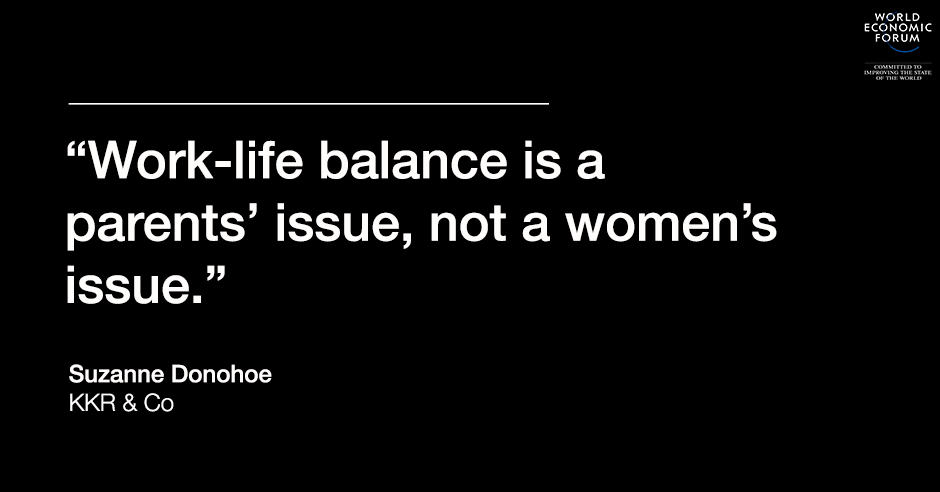“I cannot and I will not give up my family time”

Stay up to date:
Future of Work
This past Saturday, as I was sneaking in a quick run on the treadmill (between two of my kids’ soccer sessions) and catching up on the news, I was fascinated by the language Rep. Paul Ryan, who is set to be voted into office this week as the Speaker of the U.S. House of Representatives, used to talk about his dilemma when deciding whether to accept this high-pressure role.
“I cannot and I will not give up my family time,” he said. His desire to set boundaries, minimize weekend obligations and maximize time with his (young) family was so reminiscent of the internal dialogue women, particularly in finance, have with ourselves as we consider new responsibilities at work, contemplate having that first or “next” child and generally try to perform at the top of our game in our many different roles in life.
For once, I thought it was refreshing to see this issue framed not only as a “woman’s issue” but actually as a “parent’s issue,” as I see many of my colleagues in finance — both men and women – wrestle with this topic.
Despite my familiarity with work-life balance as a struggle for everyone, Paul Ryan’s desire to put family first shocked many. In this case, a prominent figure prioritizing family was considered newsworthy because that figure was a man, not a woman. The outdated idea that parenting and working is just a woman’s debate clearly still holds strong, regardless of the extensive research which has proven otherwise.
According to Pew Research surveys, today’s fathers find it equally as challenging as today’s mothers to balance work and family life. Among working fathers in America, 50 percent say it is difficult to balance the responsibilities of their family and their job – a number roughly equal to the respondents of working mothers. About the same share of Dads and Moms say they “always feel rushed” in their day-to-day lives.
 Source: Pew Research
Source: Pew Research
Similarly, when Bain & Company surveyed 1,500 MBA students and graduates asking what they want out of their careers, they found that 50 percent of men and 51 percent of women prioritized non-work commitments over career progression. At the end of the day, we’re all human and trying to balance all of life’s many priorities.
Source: Bain & Company
The conversation around working parents striving to find a manageable work-life balance is not a new one, especially in the world of private equity. While some believe it’s possible to attain and others have given up all hope of managing both, almost all focus on what actions (or inactions) parents (mostly women) need to take in order to achieve a balance that works for them. However, what many do not focus on is the employer’s role, or in Paul Ryan’s case Congress’ role, in creating a workplace that is conducive to working parents.
At KKR, a global investment firm, we have focused on these issues and created a designated Inclusion & Diversity Council and Advisory Group to ensure we’re addressing them. While we will probably always be a hard-charging and production-oriented culture, we care deeply about allowing our employees to manage their family lives – particularly during important transitions – and have put into place policies to support this.
By doing so, we’re ultimately able to attract, develop and retain the best possible talent.
We’ve already seen several employees take advantage of our extended parental leave policy, which is now up to 16 weeks, as well as our policy allowing new parents to bring their infant and caregiver while traveling for work within the first year of their child’s birth – and the feedback has been overwhelmingly positive thus far. We’re also proud to be a founding member of the Working Parent Support Coalition, in consultation with The Clinton Global Initiative. By joining this group of corporations committed to implementing an array of parental workplace support practices, we’re taking a step in the right direction.
So thank you, Paul Ryan, for shedding light on an issue that is not gender-specific, despite its many biases. Work-life balance is a parents’ issue, not a women’s issue, and is one that we all need to make strides in addressing.
To keep up with the Agenda subscribe to our weekly newsletter.
Author: Suzanne Donohoe, Member & Head of Client and Partner Group at KKR & Co.
Image: Chief executive of California-based social and educational group for parents Club MomMe Rachel Pitzel works at her home in Playa Vista, California, June 10, 2015. Picture taken June 10, 2015. To match Insight DISNEY-MOMS/ REUTERS/Mario Anzuoni
Don't miss any update on this topic
Create a free account and access your personalized content collection with our latest publications and analyses.
License and Republishing
World Economic Forum articles may be republished in accordance with the Creative Commons Attribution-NonCommercial-NoDerivatives 4.0 International Public License, and in accordance with our Terms of Use.
The views expressed in this article are those of the author alone and not the World Economic Forum.
Related topics:
Forum Stories newsletter
Bringing you weekly curated insights and analysis on the global issues that matter.
More on Equity, Diversity and InclusionSee all
Kate Whiting
June 25, 2025
Tariq Bin Hendi
June 25, 2025
Claire Poole
June 24, 2025
Julia Hakspiel
June 17, 2025







